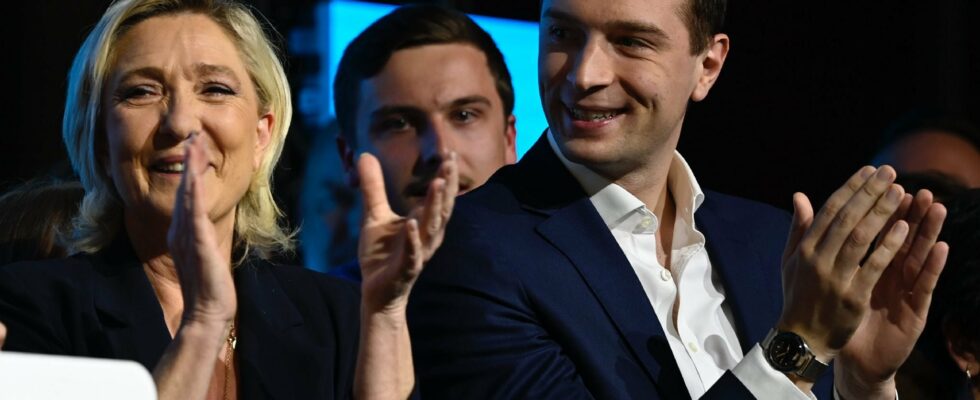“You know, even we have trouble keeping up.” The strategy of the National Rally towards its European allies is best discussed internally. For years the far-right party has brandished with more or less conviction its ambition to create a “supergroup” in the European Parliament which would bring together its nationalist counterparts.
For the moment, in Brussels, the nationalist parties are divided into two large groups. The Identity and Democracy (ID) group, which includes the National Rally and its Italian ally Matteo Salvini’s Lega, which today has 49 deputies of eight different nationalities. And the European Conservatives and Reformists (ECR) group, which has 68 seats, including representatives of Fratelli d’Italia, the ruling post-fascist party of Giorgia Meloni. According to the latest projections from Europe Elects for the European elections, a group made up of ID and ECR could reach more than 150 seats and become the second force in Brussels after the EPP, the center-right party of Ursula Von der Leyen .
Enough to push Marine Le Pen to reach out to elected officials beyond the ID group. “I think that more and more sovereignist political movements are saying that, given the wave that is carrying us, we need to be able to talk together and perhaps ultimately try to build a large group that could be the second of the European Parliament and change the balance”, she declared again, this Thursday, May 30, on Franceinfo.
“The idea was abandoned, however, assured a framework, at the end of April. We realized that it would not be possible, we are instead turning to a collaboration platform, or a vote by vote collaboration with the sovereignist parties. ” The RN, which had already campaigned for a supergroup in 2019, has always failed to achieve this large-scale alliance, and has been promoting it less recently. He begins to dream of union again. Blame it on a separation. On May 21, after another slip-up at the head of the AFD list, Marine Le Pen announced the end of her collaboration with the German far-right party allied with the RN, and member of the same Identity and Democracy group in Parliament. European.
A change of footing of the RN vis-à-vis Giorgia Meloni
To date, the ID group, amputated of part of its members, remains isolated on the European scene, and sidelined by the other European groups which surround it with a sanitary cordon and refuse to interact with parties that ‘they consider sulphurous. Obligation to open up requires, Marine Le Pen therefore made the effort to reach out to Giorgia Meloni, President of the Italian Council. “The time has come to unite […]. If we succeed, we can become the second group in the European Parliament,” she declared at the end of May Corriere della Sera. A small step for the supergroup, but a big step for Marine Le Pen, who has never hidden her disagreements with the Italian leader, and prefers the president of the Lega, Matteo Salvini.
Giorgia Meloni’s pro-Ukraine, Atlanticist and conservative positioning has not always been to the taste of the Pas-de-Calais MP who, until recently, mocked the Italian leader’s management of immigration. “It is vain to appeal to the European Union to resolve the diplomatic crisis like a child calls mom when he has a problem. It is vain and even dangerous,” Marine Le Pen privately mocked, in September, on the sidelines of his political return. And Jordan Bardella added: “If I were Italian I would be disappointed, but I am not. Our ally is Matteo Salvini.”
But the prospect of having influence in the European Parliament is well worth a few denials. “The main thing brings us together with Meloni on major subjects such as the Green deal, the end of thermal engines, the migration pact, or agricultural subjects”, assures today the RN deputy Thibaut François, partly responsible for relations with European allies.
Hungarian President Viktor Orban, an ally of Marine Le Pen, even got involved, calling for the union of sovereignists in an interview with Point, this Wednesday. “The future of the right in Europe rests in the hands of two women: Giorgia Meloni and Marine Le Pen,” he said. The president of the council reserves the right to make her courtiers wait. Because the possibility of an alliance with the EPP is also available to the far-right leader, to whom Ursula Von Der Layen has already reached out on several occasions, believing that her party represented a credible partner in Brussels. It is therefore on it that the future balance of the European Parliament rests, for the moment.
“It remains completely chimerical”
Unwilling to be distanced, Marine Le Pen recently gave of herself. On May 19, she went to Madrid, alongside other nationalist leaders, including representatives of Vox, who could become allies of the RN. For the moment, uncertainty prevails among the frontists. The question of alliances is not discussed in the campaign offices, and everyone swears that it will be dealt with on June 10, the day after the election, depending on the new political balances.
As for the advent of a supergroup, the frontists themselves remain skeptical, even if it means contradicting the boss. “We had this objective, it’s true, comments an executive. But it remains completely chimerical, we have never succeeded, we must have simpler ambitions: cooperation on texts rather than a large unrealizable alliance.” And another added, more lucidly: “In any case, if people voted for us based on our allies it would be known, no one cares, except the journalists.”
.
